| |
|
Who
is Paula C.? ¿Quién es Paula C?
|
|
Who
is Paula C.? ¿Quién es Paula C? Part 4
|
|
| English
y español |
| Part
1: All about Paula ~ How they met |
|
|
| Part
2: "Paula C." Fania Records |
| Part
3: Friends of Papa Egoro |
| Part
4: By Sandra Lafuente P. |
| Part 5: Q&A, Comments |
| Home |
|
All
material
Copyright 2007-2015 MAESTRAVIDA.COM, Alison Weinstock & Paula C- |
| Pictures
are exclusive, and the sole property of P.C. and MAESTRAVIDA.com. Unauthorized copying and public use is NOT ALLOWED under copyright laws. Estas fotos son propiedad exclusiva de P.C y Maestravida.com. Copias no autorizadas y su uso publico es estrictamente prohibido bajo la ley de derechos reservados. |
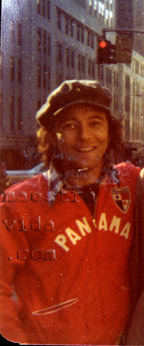 |
| |
|
Links
Paula C lyrics/letras Rubén Blades & his Cast of Characters Danilo Perez plays it  Live in Puerto Rico 1994 |
| Clippings and photos property of maestravida.com and Paula C. | ||||||||||||||||||
|
||||||||||||||||||
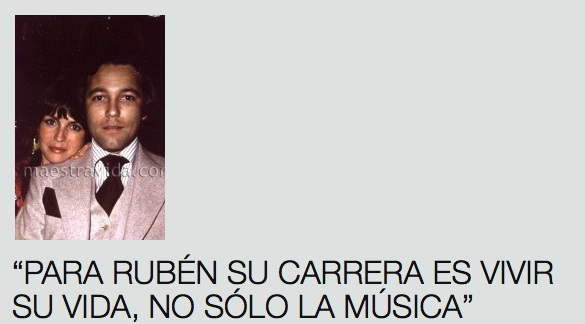 Entrevista vía correo electrónico con Paula C por Sandra Lafuente P. Revista Marcapasos 22 Mar 2010 Alison Weinstock, quien lleva la página www.maestravida.com - conocedora como nadie de la trayectoria de Rubén Blades- hizo el puente para este contacto vía correo electrónico con Paula C., el mítico personaje de la canción homónima y célebre. Bostoniana de origen irlandés, tres años mayor que él, vive todavía en el mismo apartamento de Nueva York -”por la vereda del ocho y el dos”- que compartió con Blades cuando fueron pareja, durante unos siete años. Este es un extracto traducido de la entrevista con ella, en octubre pasado, hecha para la semblanza de Blades (FOTO CORTESÍA MAESTRAVIDA.COM) |
||||||||||||||||||
| Interview by email with Paula C. by Sandra Lafuente P. 10/26/2009 Estas fotos son propiedad exclusiva de P.C y Maestravida.com. |
||||||||||||||||||
| Would you tell me your full name? I don’t like to use my last name in regards to all Blades related matters. In today’s internet environment I have had people track me down and come to my apartment door looking for Ruben or calling me asking me to contact him about all sorts of weird schemes and things. I would greatly appreciate your respecting this. It is not very important anyway. Thanks very much. I will tell you that I am Irish American from Boston and the youngest of four children. My mother was a school teacher and my father was a medical doctor. When I was little my parents loved to vacation in Cuba (without us unfortunately) My mother loved all types of music so she brought a lot of records (memba them?) back from Cuba. All of those great Cuban big bands of the 1940’s and 50’s. We would dance around our living room like maniacs to that fabulous music. For many reasons, I came from a troubled family-but when those records were on-it was such fun for all of us. I guess that is why Cuban music is so dear to my heart. I have Xavier Cugat’s Besame Mucho on my ipod. It’s a fabulous arrangement and features the singer Otto Bolivar. It was recorded in 1945 and was written by a 16yr old girl from Mexico. Do you still live in New York? Yes-actually I still live in the same apartment that Ruben and I lived in. It was my apartment and its inexpensive, has great light, plenty of room and is in the middle of Manhattan. I have lived here for 40 years. It’s my home. People in New York don’t move much. I also own a cabin in upstate New York-way in the woods. My family also has a home in Southampton. Would you tell me a bit about your life now? What do you do? My life is peaceful and centered. I have my family, my books and great friends. Like everyone else there are times of sadness and stress but for the most part it works well. I travel sometimes with my family. Next year we are going to Turkey to visit family members who own a citrus farm. I work for an executive search firm that specializes in media, entertainment education and technology. We recruit CEO level executives. Again this is a privacy issue for me. |
¿Me daría su
nombre completo? No me gusta usar mi apellido para relacionarlo con todos los asuntos de Rubén Blades. A través de Internet ha habido gente que me ha localizado y ha venido a la puerta de mi apartamento buscando a Rubén, o gente que me llama para pedirme que lo contacte de formas muy raras. Te diré que soy una estadounidense de origen irlandés de Boston y la más joven de cuatro hermanos. Mi madre fue una maestra de escuela y mi padre un médico. Cuando era pequeña, mis padres amaban vacacionar en Cuba (sin nosotros, desafortunadamente). Mi madre amaba todo tipo de música, así que trajo muchos discos de Cuba. Todas esas bandas de los cuarenta y los cincuenta. Bailábamos como locos en el salón de la casa con esa fabulosa música. Por muchas razones mi familia tenía muchos problemas, pero cuando poníamos esos discos era mucha diversión para nosotros. Imagino que por eso la música cubana es tan cercana a mi corazón. Tengo el “Bésame mucho” de Xavier Cugat en mi Ipod, con un arreglo fabuloso, presentando al cantante Otto Bolívar. Fue grabada en 1945 y escrita por una muchacha de dieciséis años de México. ¿Todavía vive en Nueva York? Sí. Vivo en el mismo apartamento en el que vivimos Rubén y yo. Es mi apartamento, no es caro, tiene una luz grandiosa, mucho espacio y está en pleno Manhattan. He vivido allí por cuarenta años. Es mi hogar. La gente de Nueva York no se muda mucho. También tengo una cabaña en la parte alta de Nueva York, en el bosque. Mi familia tiene casa en Southhampton. Cuénteme un poco de su vida en la actualidad. ¿Qué hace? Tengo una vida en paz y centrada. Tengo mi familia, mis libros y grandes amigos. Como con todo el mundo, hay tiempos de tristeza y estrés, pero la mayoría del tiempo va bien. Viajo a veces con mi familia. El año que viene vamos a Turquía a visitar parientes que tienen una granja de cidra. Trabajo para una compañía que se especializa en medios, educación para el entretenimiento y tecnología. Reclutamos ejecutivos de alto nivel. |
|||||||||||||||||
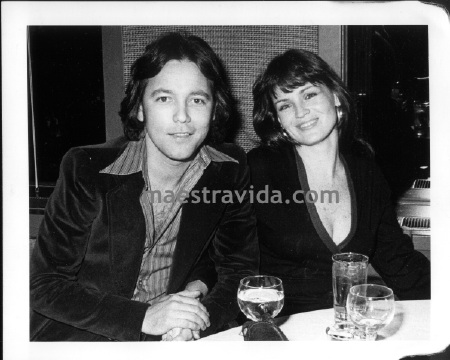 1981
photo
by Charles Corujo
|
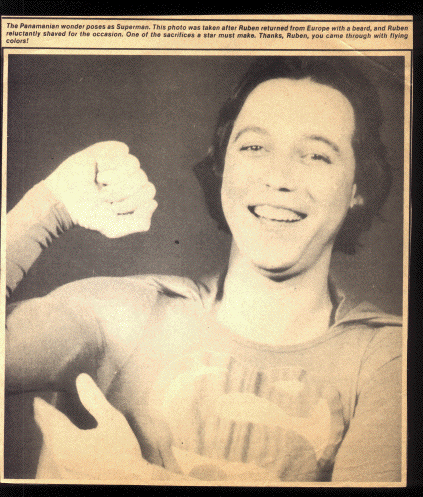 |
|||||||||||||||||
|
Are you a mother?
A Grandmother? Sort of. My
niece Jessica lives just across Central Park on the eastside of
Manhattan and has 2 wonderful children, a girl Lily who is 12 and a boy
Damon who is 10. We are a very close family and I have taken care
of them since they were born. As a matter of fact after answering
your questions I will finish sewing their Halloween costumes. Yes. And
thankfully I am in good health. Its’ a strange thing about
getting older, the years don’t matter as much as what you continue to
hold in your heart. About 6 1/2 to
7yrs. |
¿Es madre y abuela? Madre no. Abuela, casi. Mi sobrina Jessica vive justo al pasar Central Park en el este de Manhattan y tiene dos niños maravillosos. Somos una familia muy cercana y los he cuidado desde que nacieron. Para decirte más, después de responderte estas preguntas, terminaré de coser sus disfraces para Halloween. ¿Tiene 65 años, cierto? Sí, y por fortuna tengo buena salud. Es una cosa extraña eso de volverse viejo: los años no importan tanto como lo que sigues guardando en tu corazón. ¿Cuánto tiempo estuvieron Rubén Blades y usted juntos? Cerca de seis años y medio o siete años. ¿Cómo era él entonces? Lo conocí cuando todavía trabajaba en el correo de Fania Records. Siempre ha sido una persona muy interesante, ama estar en el mundo, y era divertido. Estaba quebrado todo el tiempo, pero eso no parecía molestarlo. No le interesaban mucho las cosas materiales y nunca fue lo que podrías llamar un “bien vestido”. Yo tenía un trabajo en Liberty House y lo llevamos bien. Cuando Rubén vino a Nueva York ya era bien conocido en Panamá, pero eso no era nada en comparación con lo que terminaría por pasarle. Rubén es muy inteligente, un soñador y muy prolífico como escritor. Escribía canciones todo el tiempo sobre la gente que veía en nuestro vecindario y sobre personajes que inventaba. Me tocaba cada canción nueva en su guitarra. Me sorprendían constantemente las historias que creaba; no podía imaginarme a mí misma con ese grado de creatividad. Tenía mucha curiosidad por la gente y sus vidas y nunca olvidaba las historias que le contaban. La gente lo amaba y le contaban todo sobre ellos. Él era la misma persona con el jefe de CBS Records que con la mujer del kiosco de la esquina. “Lo que ves es lo que recibes”, como dicen. Trabajó muy duro, escribió canciones y hasta cargó los equipos de las estrellas de salsa del momento. Una vez estábamos en casa por la noche y Johnny Pacheco llamó y le pidió a Rubén que fuera a recoger una tumbadora. Le dije que pensaba que no debería hacerlo, pero me dijo que lo haría porque cuando llegara al estudio con la conga podrían dejarlo cantar los coros, lo cual, por supuesto, pasó. Su voz se fue fortaleciendo, su creatividad ganó más respeto en el sello disquero y escribió más canciones exitosas para esas estrellas. Aprendí mucho de él acerca de mantenerse enfocado. En el aspecto personal, él era extremadamente divertido y constantemente hacía bromas, a mí y a todo el mundo. Era muy bueno haciéndolo. Con eso nos volvía locos, pero a él le encantaba. Me imagino que en esos días las cosas eran más fáciles y tenía menos presión. La mayoría del tiempo sólo caminábamos por Nueva York e íbamos a donde quisiéramos. Fue grandioso. |
|||||||||||||||||
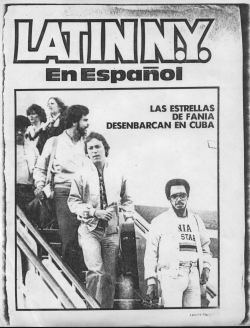 |
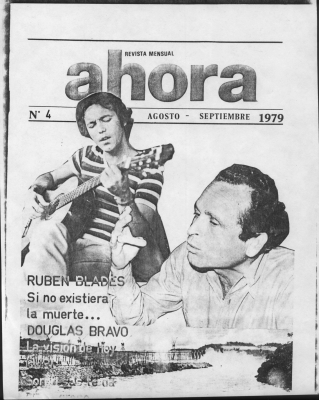 articulo: Revista Ahora, Venezuela 1979 |
|||||||||||||||||
| Tell me about his family. I think the Blades family has always been controversial in Panama. His mother Anoland was originally from Cuba and was a singer and played the piano beautifully. She once entered a talent contest in Cuba where a very young Celia Cruz was a contestant as well. She told me she thought her last name Bellido de Luna was too long for a singer, so on her way to the contest she passed Diaz grocery store and she took the name Diaz. Anoland played for Queen Elizabeth when she visited Panama in 1953. She also was a novella actress on the radio. When Ruben was little she sometimes had to take him to work. She told me that once during a scene her fellow actor was yelling at her and she had to cry as part of the script, Ruben started to cry really hard- which was broadcast. That was his first live performance. His father Ruben was a policeman and also a musician. He played bongos I think. Ruben Sr. was also a good basketball player. Panamanians knew the family from music, politics or sports. Panama City in the 50-60’s operated like a small town. Everybody knew each other and their story. Their public service vocation and how they lived in Panama. What was it like to live in barrio San Felipe? We went to Panama in 1978 and ended up staying there a month. It was a tough neighborhood even then. Siembra was out and people were thrilled with his success. I remember we went to San Felipe one day and walked all over. Ruben showed me where the family lived and I met many of his childhood friends. Everyone was so kind. Do you have a way to contact him? No. But if I ever needed him I know he would be there for me. Some years ago, I had a very difficult challenge and he was right there - standing in my living room reassuring me that everything would be fine. I don’t know how he found out about it but there he was. Do you think it was hard for him to put a pause in his career for his public service? No. He stopped his very successful music career in the 1985 and went to Harvard University and got a Masters Degree in International Law. I think for Ruben his career is living his life-not just music. Why has he been interested in politics? Everyone in Panama is interested in politics. Like with my Irish family - it’s a contact sport. National political decisions control your everyday life. They have had terrible riots in Panama, dictators, drug wars and a US invasion. What intelligent person sits back and watches this stuff play out and does nothing about it? Like they say - you are part of the problem or part of the solution. Ruben is definitely a “solution” guy. His family has a long political history. At one point in the 1970’s the family had to leave Panama and relocate in Miami for political reasons. Rubencito’s uncle Rocque was a boxer and diplomat and worked for the United Nations in the 1950-60’s. He was instrumental in cataloguing ancient artifacts rescued from the lower Nile River valley when Egypt flooded the area to build the Aswan Dam. Anoland’s great-uncle Juan Bellido de Luna was active in the Cuban revolutionary movement against Spain and was later a writer and publisher in New York. |
Cuénteme de la familia Blades Creo que la familia Blades ha sido siempre controversial en Panamá. Su madre Anoland era originariamente de Cuba, era cantante y tocaba el piano de forma muy hermosa. Una vez participó en un concurso en Cuba, donde también compitió una muy joven Celia Cruz. Anoland me contó que pensaba que su apellido Bellido de Luna era muy largo para una cantante y que cuando iba camino al concurso pasó por la tienda de víveres Díaz y tomó ese apellido. Anoland tocó para la reina Elizabeth (de Inglaterra) cuando visitó Panamá en 1953. También era actriz de radionovelas. Cuando Rubén era pequeño, a veces lo llevaba al trabajo. Ella me dijo que una vez, durante una escena, como parte del libreto su compañero actor le gritó y ella tuvo que llorar. Rubén comenzó a llorar también, muy fuerte, y eso salió al aire. Esa fue su primera interpretación en vivo. Su padre Rubén era un policía y también músico. Tocaba el bongó, creo. El señor Rubén era también un buen jugador de basketball. Los panameños conocían a la familia por su música, por la política o por los deportes. La Ciudad de Panamá de los cincuenta y los sesenta era como un pueblo. Todo el mundo se conocía. ¿Cómo era para ellos vivir en el barrio San Felipe? Fuimos a Panamá en 1978 y nos quedamos allí por un mes. Era un barrio rudo incluso entonces. Siembra estaba en el mercado y la gente estaba encantada con su éxito. Recuerdo que fuimos un día a San Felipe y lo caminamos todo. Rubén me mostró dónde vivía su familia y conocí a muchos de sus amigos de infancia. Todo el mundo era amable. ¿Tiene alguna manera de contactar a Rubén Blades? No, pero sé que si alguna vez lo necesitara, él estaría. Hace unos años, pasé por un reto muy difícil y allí estaba él, parado en mi sala, asegurándome que todo estaría bien. No sé cómo enteró, pero allí estaba. ¿Cree que fue duro para él poner una pausa en su carrera para dedicarse al servicio público? No. Él paró su muy exitosa carrera musical en 1985 y fue a la Universidad de Harvard. Creo que para Rubén su carrera es vivir su vida, no sólo la música. ¿Por qué cree que se ha interesado en política? Todo el mundo en Panamá lo hace. Como en Irlanda, es un deporte. Las decisiones políticas nacionales controlan tu vida cotidiana. Había habido terribles disturbios en Panamá, dictadores, guerras de la droga y una invasión de Estados Unidos. ¿Qué persona inteligente se queda sentada a mirarlo sin hacer nada? Como dicen, o eres parte del problema o eres parte de la solución. Rubén es definitivamente un hombre de solución. Su familia tiene un historial político largo. En algún momento en 1970 la familia tuvo que dejar Panamá y mudarse a Miami por razones políticas. El tío de Rubéncito, Rocque, era un boxeador y un diplomático y trabajaba para las Naciones Unidas entre los años cincuenta y los sesenta. El tío abuelo de Anoland, Juan Bellido de Luna, fue activo en el movimiento revolucionario de Cuba contra España y fue luego un escritor y editor en Nueva York. |
|||||||||||||||||
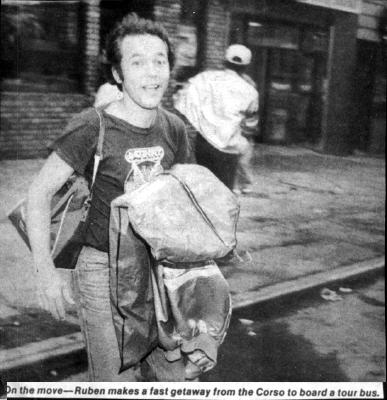 |
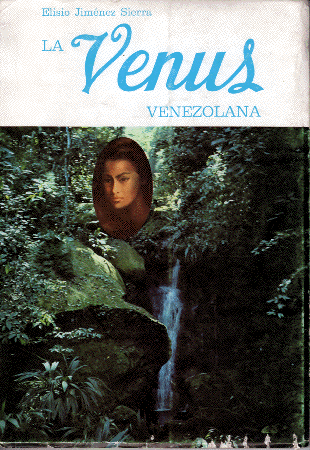 A book Rubén bought in Venezuela about Maria Lionza |
|||||||||||||||||
| Things that I have read and
heard about his
character (from himself in some cases in interviews): Impulsive -yes explosive mood -yes impatient - yes didn't go to meetings (as a minister) he thought would waste his time - He was probably right. sharp, ironic sense of humor - Yes he can be rude - Me too-probably not dealing with pressure well a very private person but very talkative. Yes - it’s a family trait. Do you confirm this? Yes I can absolutely confirm that the entire Blades family are big talkers! How would you describe his character? I've found people not wanting to talk about him at all because of some incidents while he was a minister. You cannot understand Ruben’s character without knowing about his paternal grandmother Emma. Because both of his parents worked Emma raised Rubencito. She was a very unusual woman for her time. She practiced yoga, was a Rosicrucian, a vegetarian, a painter, a poet, and a feminist who actively organized for woman’s rights. She sent her daughters to school but not her sons-she felt her daughters needed their educational credentials. ( She was right.) She also loved movies and took Rubencito to the movies all the time. She raised that little boy with a very different view of life- to think for himself and do what was right and not worry about conventions. Her influence set the foundation for his life. That was a real gift to be touched by such a marvelous woman. He spoke about her all the time. How many Ruben Blades are there? - Just two- him and his father. Do you think Ruben Blades the minister was the same as the singer, composer, writer, actor, artist? If not, how are they different? In which of these areas, or any other, is he happier? I am not sure there is an answer to this but I will share the following with you. I literally saw Ruben go from pushing a cart full of mail through the street of New York to the post office to being an international celebrity. Success is a real blessing but fame isn’t such a good outcome and not what people think. Ruben is basically a writer in several different mediums. He is telling stories and creating scenes. He is extremely gifted in this area. His music, composing and writing are snap shots in time. People who follow his work seem to feel that he should be like the characters they love. He isn’t those characters- he is telling everyone stories. He is a gifted but ordinary man who has a very public job. Creativity is a process and I would think all of them make him happy when he is engrossed in the process. I once asked Ray Barretto which of his albums he would do over if he was given the chance. He was silent for a moment and then said “all of them.” Raymond was a great guy and very talented. How many countries in Latin America did you come to with him? Well with him probably 4 in all. I have also traveled extensively in Central and South America on my own. I worked as a buyer for Liberty House which was a craft cooperative and I traveled a lot in Latin America. |
¿Cómo describiría el carácter de Rubén Blades? No puedes entender el carácter de Rubén sin saber de su abuela paterna, Emma. Como sus padres trabajaban, Emma crió a Rubéncito. Era una mujer inusual para su época. Practicaba yoga, era rosacruz, vegetariana, pintora, poeta, una feminista organizada por los derechos de las mujeres. Envió a sus hijas a la escuela, y no a sus hijos, porque decía que sus hijas necesitarían más esas credenciales educativas (tenía razón). Amaba el cine y llevaba a Rubéncito a ver películas todo el tiempo. Crió a ese niño con una visión muy diferente de la vida: pensar por sí mismo, hacer lo correcto y no preocuparse por convenciones. Su influencia sentó las bases de la vida de Rubén. Fue un verdadero regalo haber sido tocado por una mujer tan maravillosa. Hablaba de ella todo el tiempo. Él ha mencionado que no creía que viviría tanto y que esa fue la razón por la que quiso hacer tantas cosas en tan poco tiempo, y también la razón por la que no tuvo hijos. Creo que tendrá sesenta y dos años el próximo julio, un poco viejo ya para hablar de tener una vida corta. Creo que Rubéncito es un hombre muy inteligente y una persona capaz de hacer bien muchas cosas diferentes. Como Emma, es un hombre del Renacimiento ¿Cree que Rubén Blades el ministro era el mismo que el cantante, el compositor, el escritor, el actor, el artista?¿En cuál de estas áreas, u otra, es más feliz? No estoy segura de que haya una respuesta para eso pero te cuento lo siguiente. Vi literalmente a Rubén pasar de ser un cargador de un carrito lleno de cartas por las calles de Nueva York a ser una celebridad internacional. El éxito es una bendición, pero la fama no es tan buena como la gente piensa. Rubén es básicamente un escritor en diferentes medios. Él cuenta historias y crea escenas. Tiene un don. Su música, composición y escrituras son instantáneas de su tiempo. La gente que sigue su trabajo parece sentir que él es esos personajes que aman. No lo es, está contando las historias de todo el mundo. Es un hombre corriente con un don, con un trabajo muy público. La creatividad es un proceso y pensaría que todas esas facetas lo hacen feliz cuando está dentro de sus procesos. ¿A cuántos países de Latinoamérica vino usted con Rubén? Con él, probablemente a cuatro. También he viajado mucho por Centro y Suramérica por mi cuenta. Trabajaba como compradora para la cooperativa artesanal Liberty House y viajaba mucho por allá. |
|||||||||||||||||
 |
||||||||||||||||||
| Were you with him all the time when on
tour? No, hardly ever. I always had a job and my family to attend to. Part of the problem was that Ruben and I had very active far flung lives. I would travel with Ruben if he asked me to do so and I was able to go, or if afterwards we were going on vacation somewhere in Latin America. After touring in Venezuela we went to Brazil on vacation-that sort of thing. I know you might find this hard to believe but traveling with a band is boring. In those days it was hard traveling and not the most intellectually stimulating experience I have had. After hearing the same music sets a couple of times it gets tough. Sometimes we would get caught in riots, have roads wash away, get stopped by soldiers or there would be no lights, water or phones. Once in the Dominican Republic Ruben and I were temporarily kidnapped for about 5 hours by this crazy guy. It was hard traveling back in those days. Tell me about your visit to Venezuela. Did you spend time with Cesar Miguel Rondón and other friends? I have been to Venezuela several times. It is wonderful and is famous for its salsa fans. Ruben and Willie usually played at the Poliedro Arena in Caracas. After a very long flight the band would arrive the late in the afternoon before the gig and then there were endless press events. There wasn’t that much time to hang out with friends. It didn’t work like that. Ruben knew Cesar Rondon from his time in New York. I believe he is the narrator for Maestra Vida. He was a wonderful man and a very good writer. He autographed his Book of Salsa for me and I recently donated it to the Harvard Archives. I was always happy to be in his company. Please extend my best wishes to him if you know him. What's your version of what happened between him and Willy? How do you think that will end? Willie is a brilliant musician and producer. I am sorry things have turned out the way they have. He has become very embittered over the years. I have run into him several times here in New York and he wasn’t friendly towards me. I am not sure why. In a recent documentary on public television Willie said that he and Ruben had such different backgrounds that Ruben couldn’t understand him. From my perspective Willie vision was based in his Puerto Rican roots and Ruben vision was pan-American in scope. Ruben saw all of Latin and Central America as his true heritage. His creative vision was much broader, adaptable and collaborative- more in sync with the new developing music trends. Willie has run for political office several times but hasn’t won. He is a Republican in a Democratic city. I think very soon Willie Colon will be very sorry that he sued Ruben. |
¿Estaba con Rubén todo el
tiempo cuando estaba de gira? No, casi nunca. Siempre tenía trabajo y que estar pendiente de mi familia. Parte del problema fue que Rubén y yo teníamos vidas remotas muy activas, cada uno. Yo viajaba con Rubén si me lo pedía y si yo podía o si tocaba después de haber estado de vacaciones en algún punto de Latinoamérica. Puede que lo encuentres difícil de creer, pero viajar con una banda es aburrido. En esos días era difícil viajar y no era de las experiencias más intelectualmente estimulantes. Es duro escuchar la misma música tantas veces. A veces quedábamos atrapados en disturbios, nos paraban soldados o no había luz, agua o teléfonos. Una vez en República Dominicana a Rubén y a mí nos secuestraron por cinco horas, un tipo loco. Era difícil viajar entonces. Cuénteme de su visita a Venezuela. He ido a Venezuela varias veces. Es maravilloso y famoso por sus fans de la salsa. Rubén y Willie tocaban normalmente en El Poliedro. Después de largas horas en un avión, la banda llegaba al final de la tarde justo antes del concierto, y había interminables encuentros con la prensa. No había mucho tiempo para pasarlo con amigos. ¿Cuál es su version de lo que pasó entre Rubén Blades y Willie Colón. ¿Cómo cree que terminará ese asunto? Willie es un músico y productor brillante. Siento mucho que las cosas se hayan puesto así. Willie se ha amargado con los años. Me lo he tropezado varias veces aquí en Nueva York y no ha sido amigable conmigo. No sé bien porqué. En un documental reciente en la televisión pública, Willie dijo que él y Rubén tenían antecedentes tan distintos y que por eso Rubén no podía entenderlo. Desde mi perspectiva, la visión de Willie estaba basada en sus raíces puertorriqueñas y la vision de Rubén es panamericana en todo su espectro. Rubén vio toda Latinoamérica como su herencia real. Su vision creativa era mucho más amplia, adaptable y colaborativa, más en sincronía con las nuevas tendencias musicales. Willie ha competido en la política muchas veces y no ha ganado. Es un republicano en una ciudad demócrata. Creo que pronto Willie Colón estará muy arrepentido de haber demandado a Rubén. Lee también Las vueltas de Rubén Blades |
|||||||||||||||||
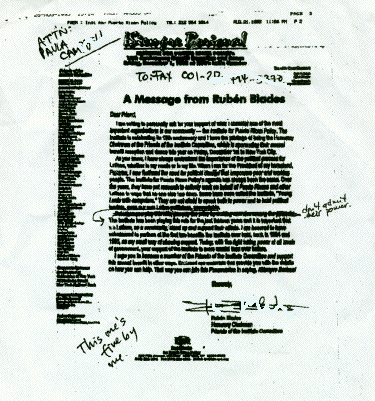 Friends of Papa Egoro |
Newsday 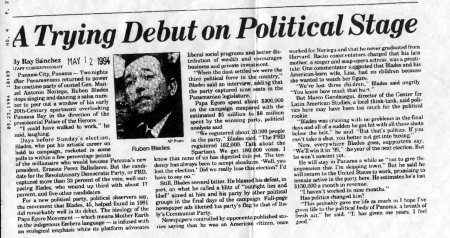 You were in Panama in 1994. No, I had planned to go but my job kept me from doing so. I did raise money for him in the US for his campaign. I gave my airline ticket to a friend Ike Trevino from Texas and he went. He also graduated from Harvard and did a write up on his trip on maestravida.com. Ike brought back a lot of Papa Egoro campaign things-which I donated to Ruben’s archives at Harvard. What do you think is the key for Papa Egoro and his attempt to be a president not being successful? I have worked on three presidential campaigns here in the US. That is a very complex question to answer. Maybe not enough money, maybe a poor ground operation or maybe corruption of the process - I have no idea. I do not think Ruben would have liked being president. |
| We wish to thank Paula
for her great generosity, kindness and humor, and for all the time and
effort she put in for this interview. We are especially grateful for
her interest and support for maestravida.com. Agradecemos a Paula su gran generosidad, cordialidad y buen humor; y por todo el tiempo y esfuerzo que nos dedicó durante la entrevista. Estamos especialmente agradecidos por su interés y apoyo a maestravida.com. COPYRIGHT 2007-2015 MAESTRAVIDA.COM, Alison Weinstock, & Paula C- Translation Copyright
2010-2015
Sandra
Lafuente P.
|
|